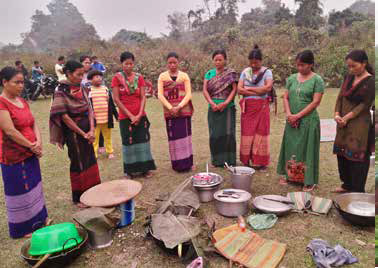
Description of the project: The CCRI carries out a participatory assessment and documentation of community conservation initiatives in the light of threats to their customary practices such as grazing and small scale agriculture, that secure their livelihoods. Communities in three ecologically diverse Indian states – Bengal, Maharashtra and Gujarat – identified external and internal threats and participated in capacity building and training workshops, as well as resource mapping and focus group discussions. The project also contributes to the implementation of the Convention on Biological Diversity’s 2011-2020 Strategic Plan and Aichi Targets by providing bottom-up policy advice on effective and appropriate forms of community conservation.
Climate impact: Local communities’ and indigenous peoples’ customary knowledge and practices regarding sustainable management of forests and grasslands is essential for climate adaptation and mitigation. Indeed, they have proven to provide human groups with enough resources for their livelihoods without over-exploiting nature. This project supports communities in defending their rights and sustainable practices against the multifaceted effects of deforestation.
Gender impact: The CCRI fostered dialogue between women and other marginalised groups of Tadoba Tiger Reserve and Gond communities, Banni grasslands and pastoralists groups in Gujarat, or eastern Himalayas in Bengal and Rabha communities from Nepal. This assessment revealed that gender differences form the basis of roles and responsibilities for the use and conservation of biodiversity and natural resources. Amplifying women’s voices in decision-making processes and allowing them access promotes gender equality and is central to protecting and recovering traditional knowledge.
Scalability/replicability: This project is part of the global CCRI program, with 68 communities conducting similar assessments in 22 countries, proving its scalability and replicability. It can easily generate effective support for community conservation initiatives by highlighting the benefits of biodiversity conservation as well as climate change mitigation and adaptation. If policy and decision-makers integrate the CCRI recommendations made by local communities, especially women, this powerful initiative will be further expanded.